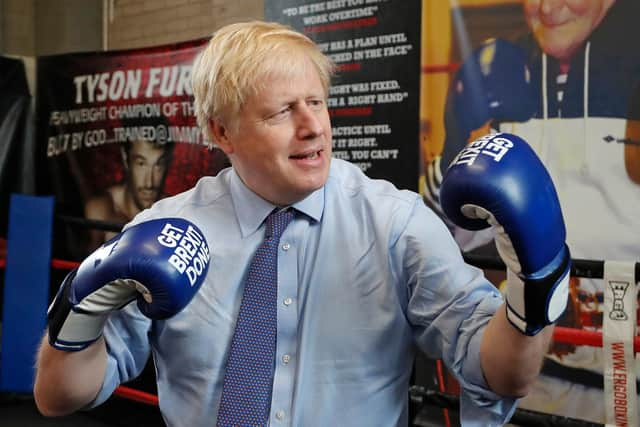UK's economic crisis reveals folly of Brexit. Scexit would be even worse – Susan Dalgety


The women weren’t waiting patiently for a sales bargain. They were in front of a food bank, hoping for free food to feed their family. Quiet desperation in one of the richest regions in the country.
Life just got a whole lot worse for those women, and the hundreds and thousands of Scots – including a quarter of a million children – whose lives are blighted by poverty. Jeremy Hunt may have targeted middle-income and wealthy households in his budget on Thursday with the highest level of taxation since the Second World War, but it will be the poor who pay the price for his party’s 12-year economic nightmare.
Advertisement
Hide AdAdvertisement
Hide AdInflation – which is now at 11 per cent and rising – hits vulnerable households the worst. The Office for National Statistics revealed earlier this week that the poorest ten per cent endured a 12.5 per cent rise in their living costs, while the richest ten per cent experienced inflation of nine per cent.
You don’t have to look very far for the reasons why we have plunged into a deep recession and are about to experience the biggest drop in living standards ever. The roots lie in David Cameron and George Osborne’s decision to implement austerity measures after the great crash of 2008, instead of boosting a teetering economy. An unexpected global pandemic cost us dearly as the economy closed down for weeks at a time.
Russia’s invasion of Ukraine has destroyed the energy market and damaged food imports. And the crazy, right-wing budget cooked up by Liz Truss and Kwasi Kwarteng so spooked the financial markets that the pound plunged to its lowest rate against the dollar ever.
But surely the biggest contributing factor to our current economic woes is Brexit. Andrew Bailey, Governor of the Bank of England, told the Treasury committee earlier this week that he thinks Brexit will cause a long-term decline in UK productivity of around three per cent.
And in an interview with Bloomberg TV, Michael Saunders, a former member of the Bank’s Monetary Policy Committee – the people who set interest rates – laid the blame firmly on Brexit. “It reduced the economy’s potential output significantly, eroded business investment,” he said, then added, “If we hadn’t had Brexit we probably wouldn’t be talking about an austerity budget this week.”
Leaving a successful economic union and single market, of which we had only been a member since 1973, has damaged our economy so much that millions are facing poverty on a scale unprecedented for a least a generation. It may even kill people.
A recent study by Professor Ian Sinha, of Alder Hey Children’s Hospital, and Sir Michael Marmot, director of the UCL Institute of Health Equity, was blunt – “fuel poverty means cold homes, but it means so much more”, including “food banks, desperate attempts to stay warm, inability to meet children’s needs, insufficient resources to pay the rent” and other stresses that “damage the health of adults and blight children’s development”. And, at the report’s launch, Professor Sinha said he had “no doubt” that children could die this winter as a result of poverty.
Yet, when the First Minister gets to her feet at the Poverty Alliance’s annual conference in Glasgow’s Royal Concert Hall this coming Friday, she will root her remarks firmly in her primary political aim of pulling Scotland out of the United Kingdom. She will no doubt refer to the increase in the Scottish Child Payment which will see up to 400,000 children eligible for £25 a week support, and she will be right to do so. Direct cash transfers to households are the simplest and most effective way to alleviate poverty, whether in Govan or sub-Saharan Africa.
Advertisement
Hide AdAdvertisement
Hide AdThis scheme is far more effective at tackling poverty than baby boxes for all and free prescriptions for the middle class, and Nicola Sturgeon deserves any plaudits she gets for it. But not even a doubling of the payment to £50 a child would protect Scotland’s most vulnerable people from the extreme austerity that independence would wreak on our economy.
Only a week ago, Ronnie MacDonald, professor of macroeconomics at the Adam Smith Business School at Glasgow University, warned that Scotland could be forced to adopt a new independent currency immediately after independence – and that move could cost the average Scottish household 20 per cent of their income. In hard currency, that means that a household which currently takes home £35,000 a year – the Scottish average – could see their spending power cut by around £7,000.
And a report last year by the respected London School of Economics, which looked at the impact of trade barriers after independence, suggested that the cost of leaving the UK would be two to three times worse for the Scottish economy than Brexit.
Nicola Sturgeon is not a stupid politician. She must know that no matter how she spins the monetary impact of leaving the UK, it will have a devastating impact on Scotland’s economy. And as we are witnessing now, it will be the poorest households that will suffer the most. Yet, as she showed last month when she launched her government’s economic prospectus for independence, she persists in her pretence that independence is essential to build a “more stable and sustainable economy”.
Is she, like Boris Johnson during the Brexit campaign, so cynical she will say anything to win her argument, even if it risks the well-being of the very people she claims to stand up for? Surely not.
Comments
Want to join the conversation? Please or to comment on this article.